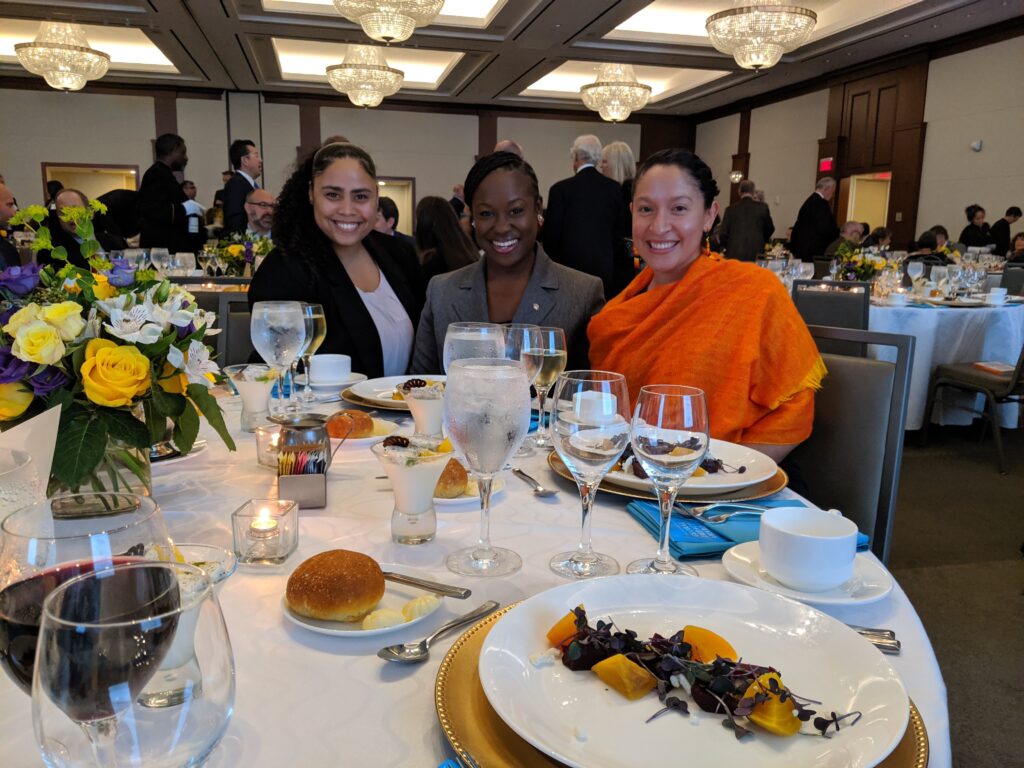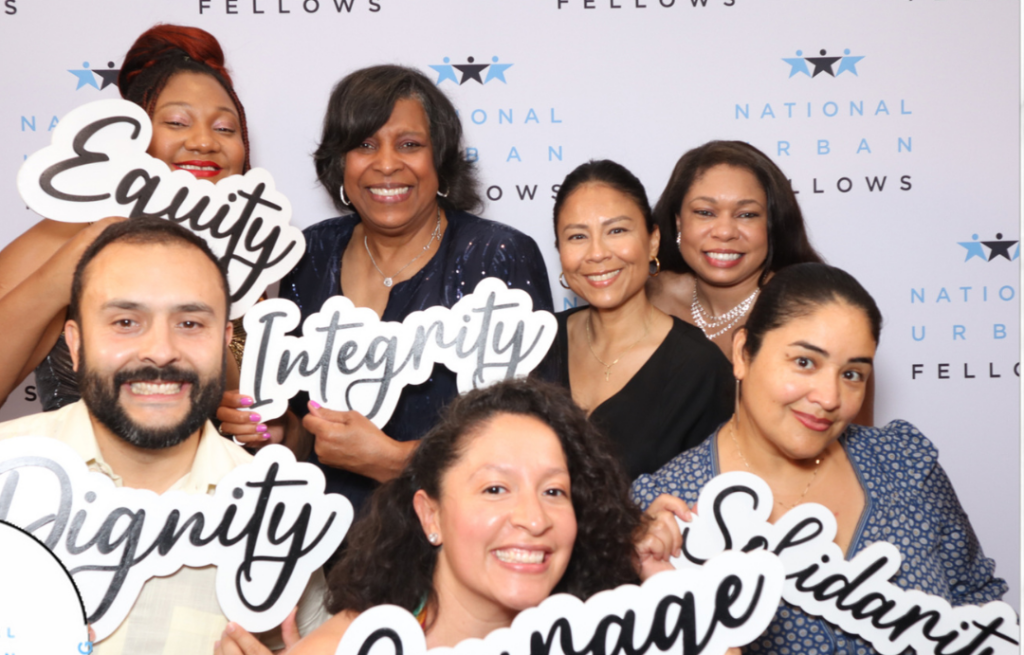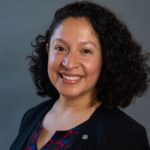
The National Urban Fellows (NUF) program describes itself as “a leadership accelerator for and a talent pipeline of early to mid-career professionals committed to equity, public service, and social impact.” The program includes a summer semester at Georgetown’s McCourt School of Public Policy, a 9-month mentorship residency with a partner organization, and a final summer semester back at Georgetown – with leadership development and coaching throughout. Fellows walk away with a fully-funded master’s degree from McCourt School of Public Policy and connection to a vast network of diverse, social impact-driven alumni.
In this interview, National Urban Fellow Cari Morales, ’20, explains how she came to apply for the fellowship, the impact of the networking and mentorship the program had for her, and shares some inspiring words for others considering the program.
Can you briefly tell us about your background and experiences?
I grew up in the South Side of Milwaukee and moved to Indianapolis as a teenager with my family. I attended Indiana University in Bloomington to complete my undergraduate degree in Policy Analysis through the School of Public and Environment Affairs. There, I, with a community of organizers, advocated for the DREAM Act and cycled for Team Mezcla in the Little 500. My first job out of college was organizing for the DART Center (Direct Action and Research Training), working in Pinellas County, Florida, and returning home to Indianapolis to work in Community Development. Born to a Puerto Rican mother and a Nicaraguan father, I always felt what I did was for and with my community, and together, we would write our story.
After completing my annual evaluation at my previous job in 2018, where I had worked for four years, I realized I would keep getting overlooked for a promotion until I had a Master’s Degree. That pushed me to begin looking for graduate programs to get my master’s degree. Something I learned about myself was that I loved cohort models since they allow me to be in a community with other like-minded individuals. I also knew I wanted the program to be full-time and accelerated because I wanted to jump back into the practice (fieldwork) rather than theory (coursework). Once I found National Urban Fellows, I knew it was the right fit.
How did you hear about the National Urban Fellows Program? What made you want to apply?
When I began to look for graduate programs to complete my master’s degree, I leaned into my network of support to explore options. I met an alumnus from the class of 2012 here in Indianapolis who introduced the program and shared her experience with me. I also attended an event at Eskenazi Hospital in Indianapolis, where I met several mentors, graduates from the class of 2018, and NUF staff.
The more I learned about the program, the more appealing it seemed. A motivating factor for me was knowing I would be going through the program with a cohort of people who shared similar values. I remember thinking how great it would be to learn from other leaders doing justice work nationwide, not only in my cohort but also in the 50+ year network of NUF Alumni. I was so excited about the opportunity to step away from my 9-5 and do something different for 14 months.
Can you describe what a typical week in the life of a National Urban Fellow is like?
There is no such “typical week” in the life of National Urban Fellows! I think that is also what is so neat about the program. NUF allows you to be flexible and adjust to the moment you are in.
My mentorship site was The Cleveland Foundation (TCF), and how the week went depended on the program and grant deadlines that were on the table. TCF took their onboarding very seriously, and one of their requirements was to participate in the Racial Equity Institute’s Phase I. The training was a two-day workshop discussing systemic racism with about 30 people working in different sectors across the city. Since I was interested in learning more about the intersection of policy, philanthropy, and climate change, I attended grant review meetings to understand TCF’s grant cycles and decision-making process. A typical week during my placement would have been a grant review meeting, sitting in on meetings with community stakeholders, attending functions hosted by grantee partners, and wrapping up the day with online courses in the evenings.

A key component of National Urban Fellows is mentorship, How did this program allow you to advance your career and expand your professional network?
I had the best mentor in the network. India Pierce-Lee was the Vice President of the Program Team and an incredible leader doing fantastic work in Cleveland. India brought me into board meetings, supported me in attending training, and exposed me to spaces I didn’t even know existed. The social capital I built during my time at NUF is something I do not take for granted. The access to executive leaders and professionals was a massive component during my time at NUF, and it has opened doors for me in the non-profit and civic sectors.
Could you tell us more about the graduate education component of this fellowship?
As a student at McCourt, I was sitting with students who worked on Capitol Hill, international students from places like Jordan and Japan, and JCS (Joint Chief of Staff). The diversity in the classroom allowed me to get outside my comfort zone and learn from others who had careers in different sectors.
What were some of the highlights of the program? What are some of your most valuable takeaways?
My most valuable takeaway from the program is the network of people I can now tap into. Not only are these people who have built power and influence in their line of work, but they are also incredible human beings. They are a source of loving accountability, friendship, and inspiration.
What do you think made you a successful candidate? What advice would you offer others interested in National Urban Fellows?
My drive to do justice and my lived experience doing change work made me a successful candidate. I advise those interested in the program to remember their WHY, to be grounded in their purpose, and to use this opportunity to grow in their power. I would also advise those who are interested in applying to be flexible. They will not know where they are placed for their mentorship until after their first summer of classes.
A few bullets to consider as you are writing your application are:
- What did your journey look like leading you to your career path?
- How would you describe your experience as a mid-career professional?
- Why do you think this program will help you “level up”?
- What do you hope to learn from your professors, classmates, and mentorship sites?
- What is your passion? What drives you? Why?
Lastly, reach out to any alumni in the network! We are always happy to talk about our experience and answer any questions.
Interested in other mid-career fellowships? Sign up to discover more than 2,600 professional and academic fellowships in the ProFellow database!

© 2023 ProFellow, LLC, all rights reserved